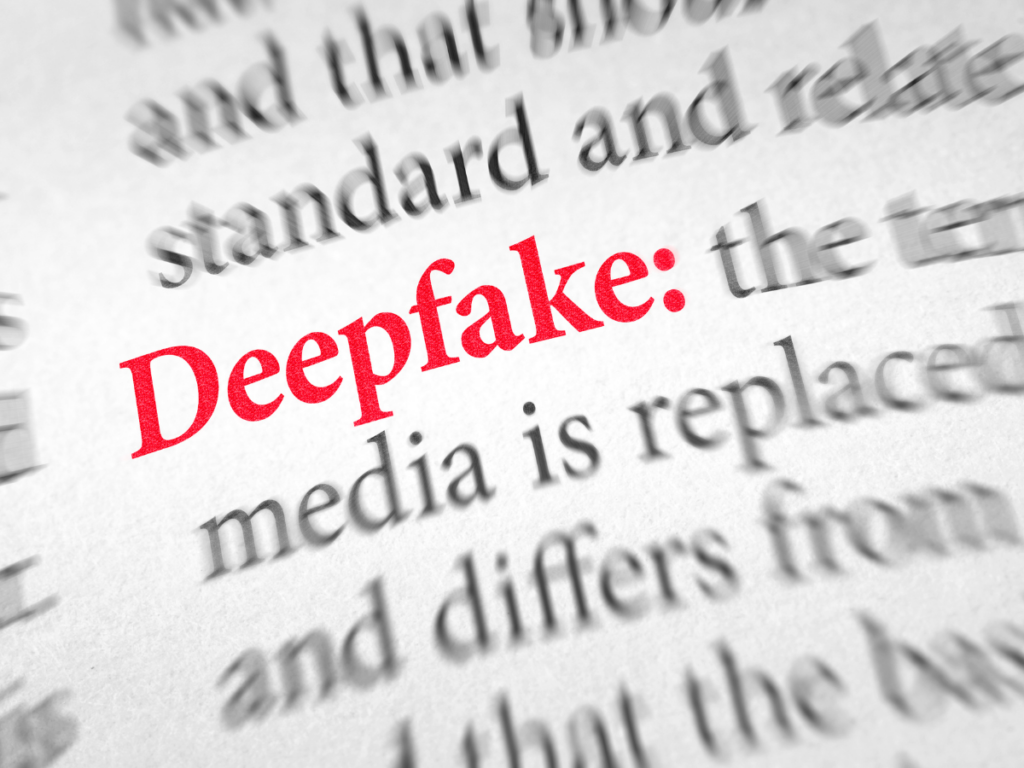Each month, Plugged In will release a blog with the latest technology and social media trends. We’ll let you know what changes to keep an eye out for. We’ll offer some tips about how to handle technology in your family. And of course, we’ll give you the scoop on those things called “hashtags” so you can stay up to date on all the things your kids might be obsessed with.
And ICYMI (“in case you missed it,” for those not up on their social acronyms), you can check out September’s Tech Trends, too.

The Problem With Deepfake Nonconsensual Pornography
Since the beginning of the year, we’ve been talking about the dangers of AI-generated deepfakes. Scammers are cloning people’s voices to steal money. Actors, such as Tom Hanks, Selena Gomez and Cher, have voiced complaints that their own likenesses are being used in songs and ads without their permission. And there’s also evidence of AI clones being used to spread propaganda in other countries.
The Los Angeles Times reports that senators are currently drafting legislation called the “Nurture Originals, Foster Art, and Keep Entertainment Safe Act, or NO FAKES, [which] would give both celebrities and ordinary people a legal recourse for the unauthorized AI replication of their likeness.”
Unfortunately, having the ability to seek legal recourse isn’t quite the same as stopping the problem at the source.
An analysis of nonconsensual deepfake porn videos shared with WIRED showed a 54% increase in uploads since AI-generators were released to the public earlier this year. What’s worse is that these aren’t just images or videos of adults.
A man in South Korea was arrested after “being caught with about 360 exploitative AI-generated images of children earlier this year,” reports CNN. A town in Spain made headlines after “a number of young schoolgirls said they received fabricated nude images of themselves that were created using an […] ‘undressing app’ powered by artificial intelligence.” And ABC News adds that the perpetrators used photos from the social media profiles of the victims.
According to NBC News, “The top prosecutors in all 50 states are urging Congress to study how artificial intelligence can be used to exploit children through pornography, and come up with legislation to further guard against it.”
I’m going to be frank: By the time that legislation comes into effect, it is going to be too late for some victims. So here are some ways you can protect your kids and prevent this from happening to them now:
- Don’t post pictures or videos of them online. Look, I know this one feels a bit extreme. It might even feel impossible. Most parents who share pics of their kids online are only doing it so that distant friends and family members can see what they’ve been up to. But here’s the thing: You can’t be sure of who else is watching. Keep your kids safe from exploitation by only sharing photos with trusted individuals instead of your whole friends list. Try blurring out their faces (or stick an emoji over them) like celebrities do. Only upload pics where they’re with other members of your family (this makes it harder for AI and abusers to single out the victim). And reduce the risk of exploitation by reducing the number of photos you upload. AI-generators need lots of source material to create a convincing image or video. So the fewer photos you post, the safer your kids will be.
- Clean up your friends/followers list. This one can be a bit tedious and time-consuming, but it is important. Check that the person claiming to be Great Aunt Sally is actually Great Aunt Sally. Consider deleting folks entirely. Ministry Safe says that 90% of sexual abuse victims are abused by someone they know and trust. It might be a tough call to make, but it might be the decision that protects your child from harm.
- Beware of grandsharenting. This one is a biggie. There are so many proud meemaws and pappys out there. But you, as the parent, have the right and the duty to protect your kids from online predators. Ask them not to share photos, or at least not to share photos without prior approval. And urge them to clean up their own friends list, as well.
- Set all of your family’s accounts to private. Stranger danger is real. Set all your accounts to private to ensure that unidentified individuals can’t see your photos. This is especially important for accounts of children and teens. Most social media sites aim to connect you with more and more people, but it’s safe to assume that you won’t know every person Facebook suggests as a friend. So keep your kids safe with private accounts and approved friends/follower lists.
- Educate your kids about the potential for deepfakes. We can do a lot to protect our kids on our end. But we also need to have some tough conversations with them about the risk they pose to themselves. Ask your teens if they feel safe with their online presence. Figure out what they do when they encounter strangers on social media. See how they feel about oversharing images. And if something does happen, and they do get exploited, don’t blame or judge them. Remind them that this was a crime committed against them. The person who should be held responsible is the person who created the fake image, not the victim.

The Problem With Meta
According to CNBC, a bipartisan group of 42 attorneys general is suing Meta, the parent company of Facebook and Instagram. The attorneys general allege that “Meta designed its Facebook and Instagram products to keep young users on them for longer and repeatedly coming back.”
To their credit, Meta recently released multiple AI chatbots for precisely this purpose. The different AI personalities are meant to attract a wider variety of audiences. But Wall Street Journal reported one as a “sassmaster general” specifically designed to have the kind of “superior intellect, sharp wit, and biting sarcasm” that attracts younger users.
Meta spokesperson Andy Stone stated disappointment that the attorneys general are seeking not only an end to Meta’s harmful practices, but also penalties and restitution. “Instead of working productively with companies across the industry to create clear, age-appropriate standards for the many apps teens use, the attorneys general have chosen this path,” he said.
Personally, I find that statement to be a lazy way of spreading the blame around instead of just taking responsibility for Meta’s actions. But I digress. The AGs are investigating other social media platforms as well, namely TikTok. They’re starting with Meta because it’s “one of the biggest players” and also because Meta addicts folks “very, very effectively and to the great detriment of millions of young people.”

The Problem With Doxing
You know, once upon a time, doxing was considered a bad thing. For those who don’t know, doxing is a type of harassment “where some tech-savvy sort searches for and exposes private information about an online individual who has caught his or her hateful gaze,” writes Bob Hoose for Plugged In. The name comes from the term “dropping dox” or “documents.” And it’s exactly the sort of thing that might result in death threats and inappropriate, unsolicited phone calls from strangers.
But recently, TikTok star Kristen Sotakoun turned ”consensual doxing” into a trend when she cyberstalked a woman who had asked folks to guess her age. Sotakoun went sleuthing, found the correct answer and posted all about it. But then Sotakoun (who had just 30 followers pre-dox) went viral.
Now, with over a million followers, Sotakoun regularly posts about “consensual doxing,” demonstrating to users how they can find very personal information about people online.
Sotakoun claims that she only doxes folks who specifically request it. And according to USA Today experts say that “’consensual doxing’ can be a useful tool for learning about how much information you’ve put out online about yourself.” However, Kimberly Vered Shashoua, a licensed clinical social worker, also warned that “people with intent to harass or harm could pick up doxing techniques from these videos.”
So, what should you do if you realize your child is requesting to be doxed? Well, start by helping them realize how dangerous it can be. According to Kaspersky (the anti-virus software company) doxers typically “aim to escalate their conflict with targets from online to the real world by revealing information” such as home addresses, workplace details, personal phone numbers, social security numbers, bank account or cred card info, embarrassing personal details, personal photos and more. (And if you read the section above about how photos can be used in deepfakes, there’s even greater reason for keeping private information private.)
Additionally, alert your kids regarding how this could present dangers to those around them. In the movie Not Okay, which I reviewed for Plugged In last year, Danni Sanders becomes a victim of doxing. And after cyberbullies release her information online, her dad begins receiving death threats at his workplace. So while your child might feel pretty confident in their own doxing, they should really consider how someone might seek to hurt them through their friends or other members of their family as well.







5 Responses
So I understand that unfortunately there’s a lot of sick people out there and yes we should be more careful nowadays with our kids especially online but I feel some of the dotted points are a little extreme. Yes my FB account is private and I make sure to not add people I know, but I have no qualms sharing photos of my son since I don’t add strangers to profile. I also have no problem having my grandparents share photos of they wanted to since they do it have social media have it as private. If others don’t want to share I understand but I don’t think it’s bad if others do. Yes we should still be careful but that doesn’t mean we shouldn’t be able to share about our kids- just my opinion…
The best defense against the lies of the media is a true relationship with Jesus Christ.
Be careful about being too general in condemning “the lies of the media.” Some media is good and some media is bad, but summarily rejecting “the media” can make you susceptible to misinformation and unreliable online sources. Research which media sources are trustworthy, and trust them.
“The LORD detests lying lips, but he delights in people who are trustworthy.” — Proverbs 12:22
This was a really good article.
I agree.